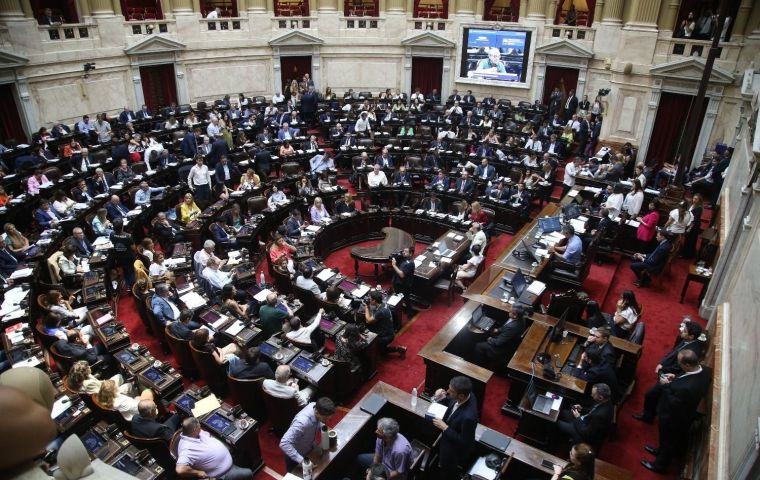MercoPress. South Atlantic News Agency
Argentina's Lower House okays extra powers to President Milei
 The bill will next go to the Senate, where Milei's LLA lacks the strength to get automatic approval and would therefore have to exert a fair amount of political muscle
The bill will next go to the Senate, where Milei's LLA lacks the strength to get automatic approval and would therefore have to exert a fair amount of political muscle Argentina's Lower House Tuesday agreed to grant President Milei on a temporary basis certain decision-making powers originally reserved by the Constitution to the Legislative Branch, it was reported in Buenos Aires. The neverending Parliamentary session also decided in favor of the partial and full privatization of several state-owned companies, among other topics included in the so-called “Omnibus Law” bill -formally the Bases Law draft that Milei regards as the starting point of his “chainsaw” economic policies.
After declaring a ”public emergency in administrative, economic, financial and energy matters for a term of one (1) year,” the bill granted Milei the powers to handle the most urgent matters, including the privatization of some State-owned companies such as Aerolíneas Argentinas, Radio y Televisión Argentina, and Intercargo which may transferred in full, while Agua Y Saneamientos Argentinos S.A (Aysa - water and sewages), Correo Argentino (Mail service), Belgrano Cargas (Cargo railroad network), Sociedad Operadora Ferroviaria S.E (Sofse) and Corredores Viales S.A. may be partially privatized.
The ruling party succeeded in overcoming the first of the most difficult obstacles in the discussion in particular of the articles of the Basic Law.
With 135 positive votes against 116 negative votes and 2 abstentions, the ruling La Libertad Avanza (LLA) succeeded in getting the head of state allowed to implement the reorganization, modification, or transformation of the State's legal structure including agencies of the central or decentralized administration, which may be dissolved if necessary.
The House also okayed the repeal of the pension moratorium mechanism whereby workers who had not contributed to their retirement funding for at least 30 years were nevertheless allowed to access the benefit after reaching the minimum age.
Under Milei's policies, employers hiring unregistered workers will not have to pay the fines such an attitude usually entails. However, the draft includes a chapter on the “promotion of registered employment” offering tax rewards to employers who regularize their unregistered workers.
In addition, a specific chapter on “force majeure in current contracts and transactional agreements” allows the Executive to renegotiate contracts for public works and services.
The Deputies also greenlighted the chapter regarding reforms to the rural labor regime.
In a marathon session that already spanned beyond 24 hours, a Regime of Incentives for Large Investments (RIGI) was also approved.
In addition, the hydrocarbons produced by YPF will no longer be declared of national interest and therefore will cease to be a priority for domestic supply. The amendment allows for the lifting of all export caps and price controls. It also established the blending of the entities regulating energy (ENRE) and gas supply (ENARGAS) into the “Ente Nacional Regulador del Gas y la Electricidad.”
Once all the articles are reviewed in particular by the Lower House, the bill will go to the Senate where the ruling party is at a disadvantage and has already failed to get Emergency Decree (DNU) 70/23 approved.




Top Comments
Disclaimer & comment rulesCommenting for this story is now closed.
If you have a Facebook account, become a fan and comment on our Facebook Page!